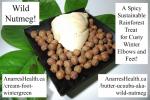Butter: Ucuuba aka Baboonwood or Wild Nutmeg, sold by the gram
Virola sebifera Butter cold pressed from the nut in Brazil. Ucuuba Butter is a natural butter cold-pressed from the seeds of the Ucuuba tree that is native to Central and South America. The tree is also known as baboon wood and wild nutmeg. It is most prominent in the Amazon river basin but is also found throughout the wetlands of Central and South America. Virola sebifera is a species of tree in the family Myristicaceae. The ucuuba tree is considered threatened, so it is important to get ucuuba butter from ethical growers and harvesters.
Sold by the gram, $.1134/g. Please bring or order a bag
MAIL ORDERS & PRE ORDERS:
You must order a minimum of 100g and buy a bag or other suitable container (search JAR or BOTTLE on our website). You must allow us to package your bulk item in a container or bag that your item will fit in safely, and agree to pay any difference before you receive your item.
COLOUR and APPEARANCE: This unrefined butter is light yellow-brown in colour, soft but dry consistency, with a crumbly texture.
SCENT: Natural grade uccuba butter has a specific sweet, spicy yet nutty smell.
COMPOSITION: Ucuhuba seed oil is the oil extracted from the seed. It contains 13% lauric acid, 69% myristic acid, 7% palmitic acid, and traces of oleic acid and linoleic acid.[4] Myristic and lauric acids comprised 91.3 mole % of the total fatty acids. Additional saturated fatty acids such as decanoic acid and stearic acid are minor components.[1]
Common Uses: The Waiãpi living in the West of Amapá State of Brazil treat malaria with an inhalation of vapour obtained from leaves of Viola surinamensis.
Ucuuba Butter is exceptionally rich in essential fatty acids and can be used to replenish, tone, and moisturize dry and mature skin. Ucuuba Butter is ideal for making pomades, creams, lotions, body butter, and other skin-care formulations. Due to its brown colour, this butter can be used to produce dark, richly coloured soaps, and it is sometimes used in candles made with vegetable-based waxes.
USING UCUUBA BUTTER IN SKINCARE
Recommended Usage:
• Body Butters & Creams: 3 - 13 %
• Bar Soaps: 5 - 20 %
• Pomades: 5 - 20 %
When adding butter to creams and lotions, gently warm both parts until the texture can be incorporated into the final product. Using a hand blender, create a vortex with your cream or lotion and drizzle your melted butter to fully incorporate. For addition in soaps, the general rule of thumb is 1 tablespoon per pound. As with most raw materials, results may vary, so we strongly recommend small, lab-scale batches prior to any commercial manufacturing.
Shelf Life: This butter should be stored in a cool dark place and has a shelf-life of 1 year when stored properly.
MEDICINAL AND TRADITIONAL USES OF UCUUBA BUTTER
The ucuuba plant has been used in indigenous medicine for treating ailments ranging from rheumatism to colic. Its superpower, however, lies in its anti-inflammatory effect, which can be very healing for a variety of skin conditions. It is also high in lauric acid and palmitic acid, both of which are important for healthy cell development, making the balm ideal for restoring skin tone and texture.
Ucuuba butter is also high in Vitamin C, which helps to reverse skin damage and is a powerful anti-ageing agent, and Vitamin A, also known as retinol. Retinol is commonly used in top-of-the-line skincare products to treat acne, fine lines, and other signs of ageing.
Ucuuba butter for eczema
Because of ucuuba butter’s skin healing benefits, it's an excellent choice for treating eczema. The anti-inflammatory agents in ucuuba butter help to reduce the associated redness, while the nutrients and fatty acid profile help to heal eczema itself.
If you have eczema, uccuba butter may help to relieve the inflammation. The high linoleic acid profile of hemp oil makes it especially useful for combatting psoriasis and eczema.
Ucuuba butter for hair
The moisturizing effect of ucuuba butter also makes it ideal for a hair treatment, while the natural antiseptic qualities help to clarify the scalp. Vitamin A and C help to protect hair from free radical damage, which helps to improve hair elasticity and to reduce breakage. While ucuuba butter can be added to a conditioner, it is best used as a mask. I also like using it as a wax leave-in conditioner to smooth my hair.
(1) FROM WIKIPEDIA Culp, T. W.; Harlow, R. D.; Litchfield, Carter; Reiser, Raymond (1965). "Analysis of triglycerides by consecutive chromatographic techniques. II. Ucuhuba kernel fat". Journal of the American Oil Chemists Society. 42: 974. doi:10.1007/BF02632458.



